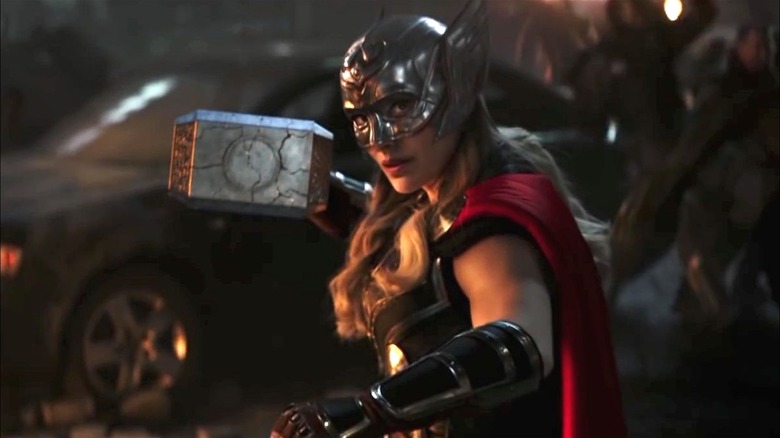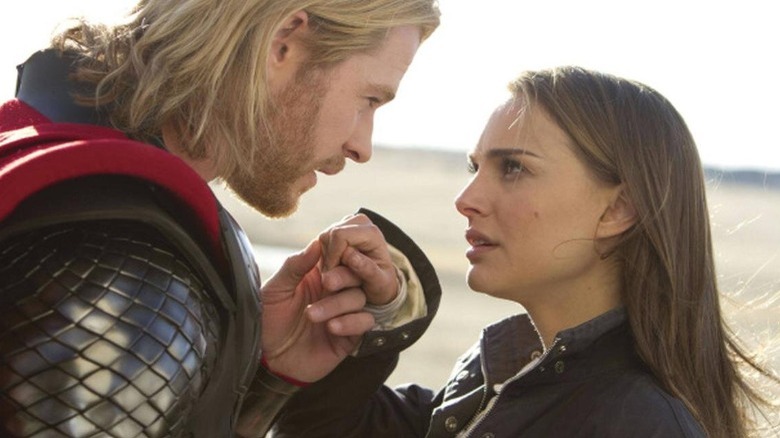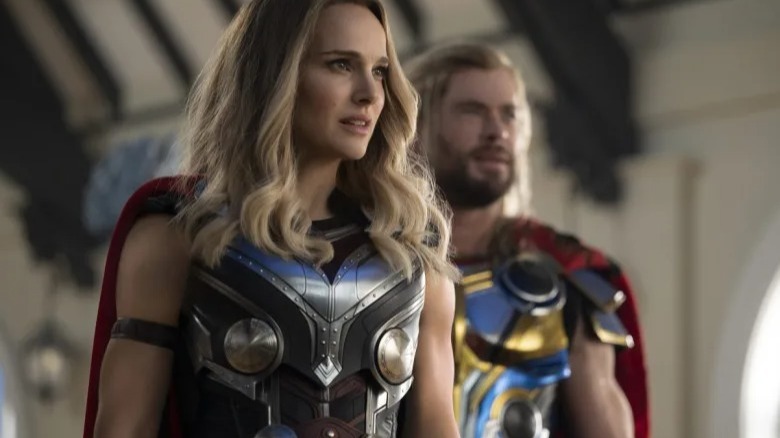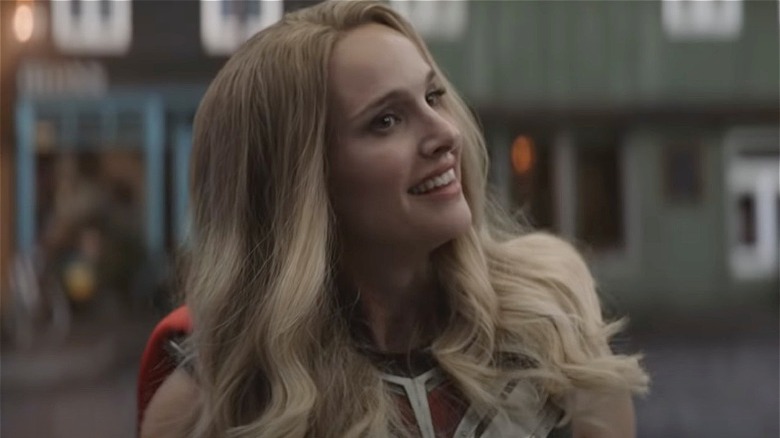How Thor: Love And Thunder Redeems Natalie Portman's Jane Foster
Warning: Major spoilers ahead for "Thor: Love and Thunder."
Taika Waititi's "Thor: Love and Thunder" ups the ante in terms of the creative risks it takes, some of which pay off, while others fall flat. One of the most exciting aspects of "Love and Thunder" (apart from Christian Bale's terrifying rendition of Gorr the God Butcher) is the return of Jane Foster (Natalie Portman) as The Mighty Thor, a welcome surprise in all respects.
Jane's return to the storyline brings an element of empowerment to her character, which was previously undercooked/mishandled in the first two Thor movies. Although Jane has always been a resilient, intelligent person — a brilliant astrophysicist who did some incredible research on the complex Einstein–Rosen Bridge theory — her character was reduced to a damsel in distress in "Thor: The Dark World," after which she completely disappeared from the MCU (I wouldn't count the dubious shot of the back of her head in "Avengers: Endgame").
In many ways, "Thor: Love and Thunder" redeems the spotty characterization of Jane Foster, giving a somewhat-satisfying conclusion to her storyline in the end-credits scene. Here's how the film accomplishes this.
A love interest only meant to set Thor on the right path
In Kenneth Branagh's "Thor," the titular hero (unwillingly) embarks on a journey of self-discovery after he is exiled to Earth by his father, Odin (Anthony Hopkins), as the latter feels that Thor is not worthy to become the next king. After Thor meets Jane, the two gradually develop a romance and Jane teaches Thor the value of self-sacrifice, which later allows him to face and defeat the Destroyer sent by Loki (Tom Hiddleston). Thor has always been a flawed hero, demonstrating a lot of personal growth over the years, and it is Jane who helps ground him, which in turn, allows him to become the person he is meant to be.
While this is great for Thor's trajectory, it means very little for Jane, who is simply posited as a love interest intrinsic for furthering the Hero's Journey. Although she does have agency in terms of her work as a scientist, that aspect is used to simply further the plot again in "Thor: The Dark World," as it is her scientific curiosity that leads her to be infused with radioactive Aether. Throughout the course of the second film, while Jane does hold her own in many respects, it is Thor and his allies who save her Malekith in the end.
Although Thor and Jane are seen reuniting by the end of "Dark World," the character is promptly sidelined without any explanation, except a few offhanded comments about a breakup and how she's won the Nobel Prize due to her contributions in the scientific realm.
The return of Jane, and the importance of character agency
"Love and Thunder" sets the record straight with the aid of Korg's (Waititi) storytelling: we see a glimpse into how Thor and Jane were initially happy together, but gradually felt distanced from one another, apparently due to the fear of losing the one they loved so dearly. This is pretty realistic, as the smallest of things can pile up and ruin the best of relationships, and this is what happens in this case: Jane decides to leave Thor, as the gulf between them kept widening over time.
Apart from this, we do get some insight into Jane as a character, as we learn about her mother's death when she was a kid, and how life forced her to be resilient against all odds. She's obviously a big deal in the scientific world, having penned "The Foster Theory: Space and Time Travel," which is shown in the film, hinting that Jane is a well-respected astrophysicist, who is quite well-known. Batting stage-four cancer, Jane tries scientific methods to get better but is intuitively called to the Mjolnir, which chooses her, imparting her the strength and energy required to become The Mighty Thor.
Although Jane is new to superhero-ing, she is unflinchingly brave and dives straight into the action, never hesitating to even take on someone as menacing as Gorr. To have powers is one thing, and to use them selflessly is another — a good example is Zeus himself, who, despite being the Greek god of thunder, chooses to spend his days chasing vain and meaningless pursuits. When Jane succumbs to her cancer (using Mjolnir only temporarily gave her strength, and thwarted her body's natural ability to heal), Thor gives her the choice to either stay back or fight. She chooses to fight.
Leaving behind a legacy of love and thunder
Before delving into this, I just want to point out how badass Jane was when Gorr calls her "Lady Thor." She says that she's okay with him calling her either The Mighty Thor or Jane Foster, which is a cool way of representing how she's proud of both of her identities, both superhuman and human.
After Jane and Thor fight Gorr for one last time, and Jane demolishes the Necrosword, she is about to die, as using Mjolnir accelerates the process of her cancer. Thor and Jane affirm that they love one another, and after Gorr says that his daughter would grow up alone, Jane says that she won't, a look of understanding passing between her and Thor. Even when on the verge of death, Jane is empathetic to Gorr (which plays a part in his decision to choose love) and helps Thor find new meaning in life, which he happily accepts. Later, we see a statue erected in Jane's memory, as her contribution to defeating Gorr is instrumental, and she left behind a legacy of love and thunder.
In the post-credits scene, we see Jane in Valhalla, as she died a "Space Viking" during battle (also, if anyone deserves to go to Valhalla after death, it's Jane). She meets Heimdall (Idris Elba), who welcomes her, and this is just a re-affirmation that she was worthy all along. This is a good way of closing out Jane's arc within the context of the direction the film decided to march in, surely.
"Thor: Love and Thunder" is currently playing in theaters.



